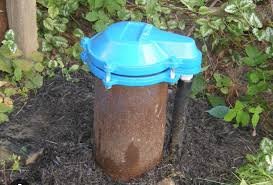
What is a water well and how do I take care of it?
The truth: Many homes in the mountains are not connected to a public shared water system. This is based simply on location and access to homes that are built into the hills.
The good news: A water well on your property allows you to live in beautiful locations not dependent on a public system!
What is a water well?
A water well is a pump that is drilled into the ground hundreds or thousands of feet deep. The well pulls water from a below ground natural aquifer through a casing into a tank(s) in your basement or on your property. The water is then filtered through various purification systems and can be used in your house for sinks, toilets and bath tubs.
The tank is buried in your yard and all you see is the well cap sticking out for service needs.
How it works:
Sewage goes in from your house into the tank where oils and grease float (scum layer) to the top and solids sink to the bottom (sludge). Those elements break down with bacteria and the rest is liquid.
The scum and sludge stay in the tank the liquid drains out in to the leach field.
The liquid goes into the leach field where it either percolates down through the soil or evaporates into the air (don’t worry, you can’t smell it) naturally removing harmful coliform bacteria, viruses and nutrients.
What you need to know as a home owner
Congrats! You have a mountain home, but that come with responsibility. Most of the time you will never know you are using a private water well instead of public system. However, you do need to know best practices when using a well.
Water Well Best Practices
Test Your System: It’s best to have your entire system (pump, storage tank, pipes and valves) and the output (water flow) inspected every 5 years by a licensed well contractor. Wells are considered to last 20 years or more.
Test Water Quality: Water should be tested to ensure it is safe to drink, ideally every year to avoid bacteria or contaminants. If you notice any change in color or taste, or if you have a major flood or environmental change, you should have the water re-tested. Read more with the Homeowner’s Guide to Safe Drinking Water.
Change Water Filters: Your water is filtered from the water well. Filters are most often found in your house before or after the water is stored in your water tank. Various filters exist but you will want to ensure you are properly changing your filter on a regular basis. I have two filters: one is changed every three months and one is a UV light filter that is changed once a year.
Protect your well cap: Keep the cap of your well clear of leaves, mulch, dirt, snow, and other materials. Be careful when you mow around it so you don’t damage the well casing. Inspect often for cracks or damage.
Needs electricity: The first time the power goes out it’s alarming because suddenly your water doesn’t work! Remember, the well needs an electric pump to pull the water into your house so if you don’t have electricity your sinks, showers and toilet won’t work. Consider getting a portable or whole-house generator (if your house does not already have one) to ensure you can use your water should the power go out.
Avoid chemicals: Keep household chemicals and paint away from your well and dispose of them properly. Take used motor oil to a recycling center.
Limit your use of pesticides and fertilizers: Products in your yard could possibly impact the water underneath your property.
For more information, download a well water guide for home owners online.
When buying a house with a water well
Get documentation: When buying or selling a home you want to make sure there is proper documentation and valid permit for the water well from the county. The permit should be transferred through the title company upon closure of the sale. Permits started in 1972 so for houses before then we will need to verify the well is legal and legit. If no permit, the timeline for closing on the house could be extended to ensure a proper permit is issued.
Use: What does the permit allow you to do? Just drinking and home use (toilets and showers)? Or also for irrigation and gardens? Horses and livestock?
Water Rights: Are there any water rights with this property? Or, as in most cases in Colorado, do the rights belong “downhill” from the source? Exempt permits mean they are exempt from water right rules, non-exempt means they must adhere to water right rules.
Flow Meters: Does the well permit require a flow meter and, if so, is there one? If required, but missing, we will work it out with the seller or buyer. The meter could be in the well or in the house.
Testing: We will have the water well tested, including evaluating the tank, pump, etc, as well as the water quality level tested (is it safe to drink?) by the county or a private company
HOAs: Are there HOA requirements on the use of your well?
Multiple Wells: Are there more than one wells on your property? What is the intended use of each?
If your property does not have a well, or you are constructing a new building on vacant land and you need a new well, you need to hire a local, insured well drilling company to ensure proper installation, location and depth based on local requirements and landscape.
GeoWater in Evergreen
Living Water Pump in Pine
Let me help
Water Wells don’t have to be complicated. I’d be glad to help you navigate this, septics, propane and all. Reach out to get started.



